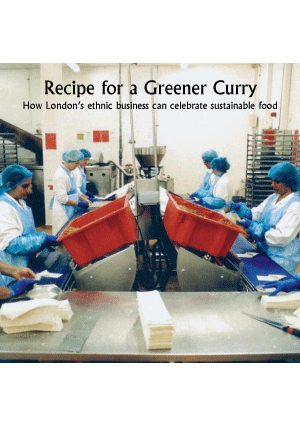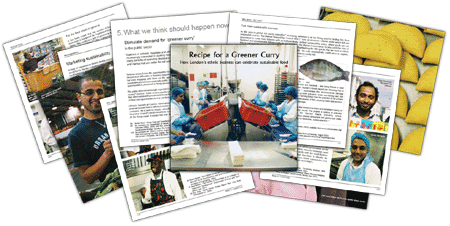
Recipe for a Greener Curry: How London's ethnic business can celebrate sustainable food
ISBN: 1-903060-42-7 128pp - 2007 | 2527Kb


Recipe for a Greener Curry: How London's ethnic business can celebrate sustainable food
ISBN: 1-903060-42-7 128pp - 2007 | 2527Kb
 Black, Asian and Minority Ethnic (BAME) businesses are vital for the cultural and economic vibrancy food in London, and Britain. Yet this ground-breaking report shows that, like the rest of the food sector, many businesses have not yet grasped the market opportunities presented by our growing appetite for sustainable food.
Black, Asian and Minority Ethnic (BAME) businesses are vital for the cultural and economic vibrancy food in London, and Britain. Yet this ground-breaking report shows that, like the rest of the food sector, many businesses have not yet grasped the market opportunities presented by our growing appetite for sustainable food.
It has become a modern cliché to say that ‘green’ is the new black. Sustainability is, at last, fashionable and the UK market for ethical food - for example organic, fair trade and local - has now reached at least £2 billion. This report explores how much "black" has embraced "green".
Black, Asian and Minority Ethnic (BAME) businesses make a major contribution to the cultural vibrancy of British food, with the market for "ethnic" food generating some £1.29 billion in 2004, and still rising. Yet this
London Food Link (LFL) report shows that many of these businesses - as in the rest of the food sector - have not yet grasped the market opportunities presented by our growing appetite for sustainable food.
In this under-researched area, London Food Link undertook face-to-face and telephone interviews with BAME owners of micro, small and medium-sized enterprises (SMEs) across the food sector - from farmers to caterers - and also approached people at a range of public and trade events. We now have a vivid snapshot of:
This 128-page report recommends that Government provides both money and a higher profile for measures to stimulate the supply of sustainable food from small and medium-sized enterprises (SMEs) as well as the demand for sustainable food, including from schools, hospitals and other public sector caterers. As well as calling for Government action, Recipe for a Greener Curry gives well-deserved publicity to the current “green” entrepreneurs in the BAME food sector, and also aims to inspire others to build on their achievements, finding new and exciting ways of bringing culturally distinctive, delicious and sustainable food to our plates.
The report was researched and written by Sustain project officer Zeenat Anjari, supported by London Food Link colleagues
Foreword
Summary and recommendations
1. Introduction
2. Why ‘green’, why ‘curry’?
3. What we did
4. What we found
5. What we think should happen now
6. Recommendations
Case studies
Appendices
Acknowledgements
London Food Link: London Food Link brings together community food enterprises and projects that are working to make good food accessible to everyone in London to help create a healthy, sustainable and ethical food system for all.
Sustain
The Green House
244-254 Cambridge Heath Road
London E2 9DA
020 3559 6777
sustain@sustainweb.org
Sustain advocates food and agriculture policies and practices that enhance the health and welfare of people and animals, improve the working and living environment, promote equity and enrich society and culture.
© Sustain 2026
Registered charity (no. 1018643)
Data privacy & cookies
Icons by Icons8